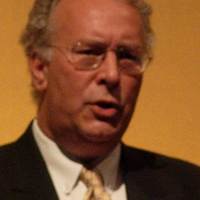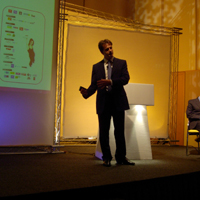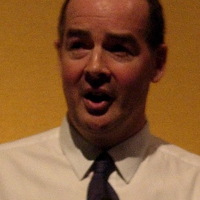We’re really pleased to have Lawrence Dudley writing for us.
Digital-Lifestyles thinks that all too often articles about teenagers are written by people old enough to be their parents. What teenagers are thinking isn’t represented.
Lawrence will give you a point of view that you won’t find in other publications. You see Lawrence _is_ a teenager.
 There’s a Trust Issue Here
There’s a Trust Issue Here
With the Digital world coming ever closer to reality, there is a danger of the two merging. The upshot of this is a danger that people become so involved with the Digital world, that they lose a grasp of reality. In short, they become addicted.
Internet addiction disorder is already a widely recognised addiction and those most likely to become addicted to the Internet are teenagers. This is partly because of the anonymity and therefore reputation-less nature of the Internet, allowing them to be whoever they want to be, and partly because teens just have so much more time on their hands than their grown-up counterparts. This together, results in a vast amount of Internet use.
What can responsible parents do when their teenager refuses to turn off the computer or refuses to go to school because they’ve been up too late playing online?
There are two approaches: The first is to talk to the child in question about the problem. While this will work with the majority of responsible teenagers, there will always be a minority who won’t listen. The other approach is using parental control software which can do a variety of things including limit the amount of time that a user is allowed to spend on the Internet. Trouble with any sort of software solution is, of course, that it can easily hacked or broken. Very often the teenager has a much better knowledge of the computer than the parent has.
 A company called Woog Labs (yes, really) have unveiled a product that is designed to be hack-proof and will apparently work for any operating system.
A company called Woog Labs (yes, really) have unveiled a product that is designed to be hack-proof and will apparently work for any operating system.
Trouble with it is that A) It requires an adaptor to be used with any video cable other than VGA (mine’s DVI), and B) It only works with PS/2 Keyboards… PS/2?!
This makes their claim that it works with any operating system a bit hard to swallow: I’m sure that theoretically, this device will work on Mac OS X. However, to my knowledge there has NEVER been a Mac shipped with a PS/2 port. Makes it a bit useless really…
I can see that there is probably a market for a device like this, but what’s really needed is for someone to educate parents on their responsibilities. Surely it should be up to the parents to teach the kids what’s right and what’s wrong? If they don’t, then what are the kids going to do when they grow older? When they are forced to look after themselves? Digital nannying should only go so far in my opinion.
 Ofcom estimates that the digital switchover programme will release up to 112 MHz of spectrum in the UHF (Ultra High Frequency) band for new uses. The UHF band is prime spectrum, because it offers a technically valuable combination of capacity (bandwidth) and range.
Ofcom estimates that the digital switchover programme will release up to 112 MHz of spectrum in the UHF (Ultra High Frequency) band for new uses. The UHF band is prime spectrum, because it offers a technically valuable combination of capacity (bandwidth) and range. 3. The significance (or lack thereof) of these reports should be plainly stated. Similarly, if Ofcom is not necessarily endorsing a particular report’s conclusions, it should plainly state that fact. An ‘evidence-based’ regulator should be very clear as to how it treats these findings made by third parties. If the Scientific Generics report is not endorsed by the Ofcom Board, but it is merely one of many research inputs on the issue of digital switchover costs, then Walls’ claims are clearly overstated. However, it’s hard to blame the press when reports like these are published on the Ofcom website with no disclaimers, giving them the imprimatur of Ofcom approval.
3. The significance (or lack thereof) of these reports should be plainly stated. Similarly, if Ofcom is not necessarily endorsing a particular report’s conclusions, it should plainly state that fact. An ‘evidence-based’ regulator should be very clear as to how it treats these findings made by third parties. If the Scientific Generics report is not endorsed by the Ofcom Board, but it is merely one of many research inputs on the issue of digital switchover costs, then Walls’ claims are clearly overstated. However, it’s hard to blame the press when reports like these are published on the Ofcom website with no disclaimers, giving them the imprimatur of Ofcom approval. Ofcom, the UK uber-regulator, has today announced that they have removed the licensing restrictions on the frequency that radio frequency identification(RFID) tags use.
Ofcom, the UK uber-regulator, has today announced that they have removed the licensing restrictions on the frequency that radio frequency identification(RFID) tags use. Grokster, the online music sharing service, much legally embattled, has decided to shut the service and pay $50 million to settle claims against it.
Grokster, the online music sharing service, much legally embattled, has decided to shut the service and pay $50 million to settle claims against it. There is a plan to launch a service that they say will be a “safe and legal service” under the name Grokster 3G.
There is a plan to launch a service that they say will be a “safe and legal service” under the name Grokster 3G. Partially arguing against the UK ban on advertising by organisations that attempt to “influence public opinion on a matter of controversy”, she says her group will challenge the ban. Allen is right in some respects when she says:
Partially arguing against the UK ban on advertising by organisations that attempt to “influence public opinion on a matter of controversy”, she says her group will challenge the ban. Allen is right in some respects when she says: Handy… Literally!
Handy… Literally! Sounds nasty!
Sounds nasty! That lot again
That lot again The UK production and development community is in danger of losing out to competition from overseas if it doesn’t wake up to the potential of mobile TV, said Mark Selby, Nokia’s Global Vice President for Multimedia, (pictured right) at the inaugural Mobile TV forum in London today.
The UK production and development community is in danger of losing out to competition from overseas if it doesn’t wake up to the potential of mobile TV, said Mark Selby, Nokia’s Global Vice President for Multimedia, (pictured right) at the inaugural Mobile TV forum in London today. But many claimed that the lack of spectrum is holding DVB-H back in the UK.
But many claimed that the lack of spectrum is holding DVB-H back in the UK. Digital One owns the UK’s only nationwide commercial DAB multiplex – but the capacity allocated for DMB is minimal.
Digital One owns the UK’s only nationwide commercial DAB multiplex – but the capacity allocated for DMB is minimal. From a technical perspective switchover it is not going to be a walk in the park. A phased switchover to digital by geographical area between 2008 and 2012. And we’ll only know how many people might be unable to get digital television once the analogue signal has been turned off and the digital signal boosted.
From a technical perspective switchover it is not going to be a walk in the park. A phased switchover to digital by geographical area between 2008 and 2012. And we’ll only know how many people might be unable to get digital television once the analogue signal has been turned off and the digital signal boosted. The boffins at the US National Science Foundation (NSF) have proposed “re-engineering” the Internet to create a whizz-bang updated version that connects all kinds of devices with built in security and robustness.
The boffins at the US National Science Foundation (NSF) have proposed “re-engineering” the Internet to create a whizz-bang updated version that connects all kinds of devices with built in security and robustness. The goals of the GENI Initiative include a new core functionality for the Internet, with new naming, addressing, and identity architectures; enhanced capabilities, including additional security architecture and a design for high availability; and new Internet services and applications.
The goals of the GENI Initiative include a new core functionality for the Internet, with new naming, addressing, and identity architectures; enhanced capabilities, including additional security architecture and a design for high availability; and new Internet services and applications.